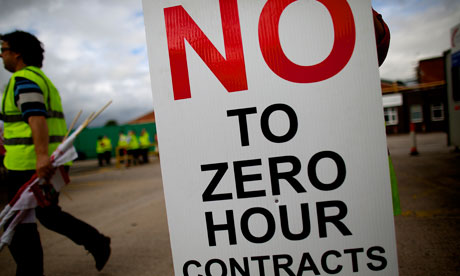Five-Fold Increase in Flexible Working Since 1999
The number of people working flexible hours has increased five-fold in the last two decades according to an analysis of working trends by the Association of...
Read Full Article
According to the latest figures from the Office for National Statistics, over 800,000 people are on a contract that guarantees no minimum hours in their main job.
If correct the ONS believes the number of zero-hour contracts amount to 2.5% of the employed UK workforce which is up from 2.3% in the same period of 2014.
People on zero-hours contracts were more likely to be young, part time, women, or in full-time education when compared with other people in employment and on average, someone on a zero-hours contract usually worked 26 hours a week. Approximately one in three people (37%) on a zero-hours contract wanted more hours with most preferring that in their current job as opposed to a different one that offered more hours. In comparison, 10% of other people in employment wanted more hours.
“This latest figure is rather higher than the 697,000 people who said they were on these contracts in late 2014,” said Nick Palmer, Statistician ONS. “Though at least some of this increase may be due to greater public recognition of the term ‘zero-hours contract’, there’s also nothing to suggest this form of employment is in decline.”
No minimum guarantee
In November 2015 there were roughly 1.7 million contracts that did not guarantee a minimum number of hours where some work had recently been carried out, according to the latest ONS survey of businesses.
For May 2015 the equivalent estimate was 2.1 million, though some of the difference between May and November could be caused by seasonal factors and the ONS argues that estimates for different times of year should not be compared directly. “The difference between estimates from the business survey and from the LFS would partly be accounted for by people who have more than one such contract with different employers or those who are on fixed hours in their main job but supplement this with a second job without guaranteed hours,” explained Palmer.
Reactions to figures
The trades union movement was quick to critics this apparent rise in zero-hours contracts.
“Zero-hour contracts may be a dream for cost cutting employers but they can be a nightmare for workers,” observed Frances O’Grady, General Secretary, TUC. “Many people on zero-hours contracts are unable to plan for their future and regularly struggle with paying bills and having a decent family life.
O’Grady believed that the “so-called ‘flexibility’ these contracts offer is far too one-sided. Staff without guaranteed pay have much less power to stand up for their rights and often feel afraid to turn down shifts in case they fall out of favour with their boss.”
In research published by the TUC, average weekly earnings for zero-hours workers were £188, compared with £479 for permanent workers. Two-fifths (39%) of zero-hours workers earned less than £111 a week – the qualifying threshold for statutory sick pay – compared with 1 in 12 (8%) permanent employees.
The TUC is also arguing that as the EU was proposing better rights for zero-hours workers, it could be another reason why they should be worried about the ‘risks’ of a Brexit.
Speaking for the employers, the CBI believed there has to be a sense of proportion. “Zero-hours contracts are a small proportion of the UK labour market with the most important aspect being that they benefit both the individual and their employer,” stated Neil Carberry, Director for Employment and Skills, CBI. “The government has taken action to ban exclusivity clauses, a move supported by the CBI, while protecting the flexibility in our labour market that continues to be a great asset to the UK economy.”
Picture: Zero-hours contracts continue to be a bone of contention and have risen according to the latest figures from ONS
Article written by Mike Gannon | Published 11 March 2016
The number of people working flexible hours has increased five-fold in the last two decades according to an analysis of working trends by the Association of...
Read Full ArticleHot on the heels of a new government consultation to improve the rights of variable hours workers, the CIPD has launched employer guidance to help ensure such atypical...
Read Full ArticleSafety is one of the biggest concerns in the construction and allied industries, writes Daniel Ure. And since one of the biggest risks to workers is posed by mental...
Read Full Article66% of UK employees work an average of 6.3 hours per week without pay with around 22% admitting to working more than 10 unpaid hours over five days according to a new...
Read Full ArticleFigures released by the Office for National Statistics (ONS) show that more women took their own lives in 2015 than at any time in the previous decade and that deaths by...
Read Full ArticleThe results for the Crime Survey of England and Wales (CSEW) by the Office of National Statistics reveal for the first time that fraud is the most prevalent crime...
Read Full ArticleThe ONS Crime in England and Wales report for the year ending December 2015 has revealed that ‘violence against the person’ offences, recorded by the police,...
Read Full Article